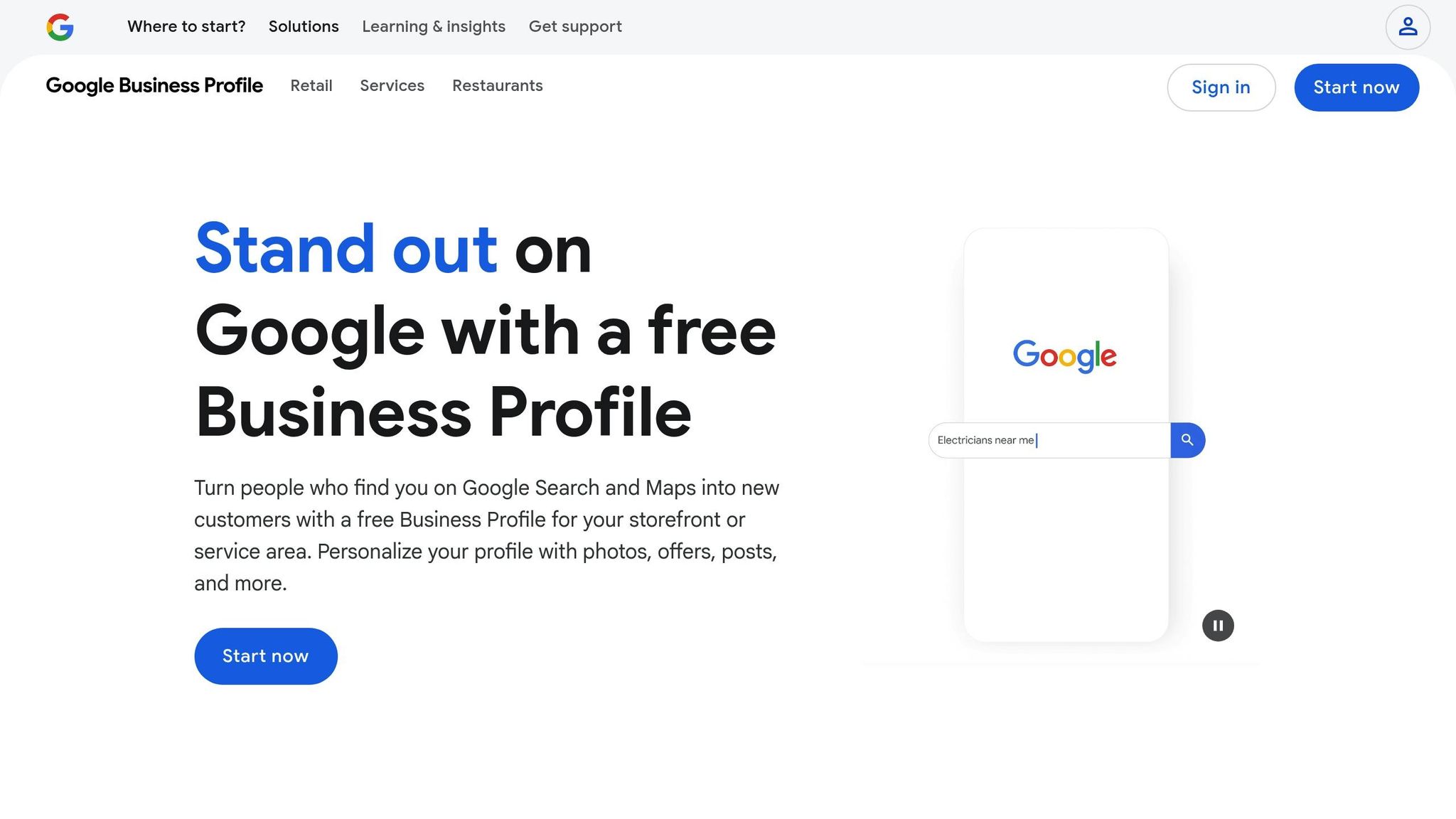If you’re a business in Charleston, ranking for "near me" searches is crucial. Why? 46% of Google searches have local intent, and 76% of mobile searches lead to visits within a day. Whether it’s locals needing quick services or tourists exploring the area, optimizing for local SEO can connect you to high-intent customers.
Here’s how to get started:
- Research Local Keywords: Use tools like Google Autocomplete, Keyword Planner, and Ahrefs to find terms like "plumber in Charleston" or "best bakery near me."
- Optimize Your Google Business Profile: Claim, verify, and complete your profile with accurate details, photos, and a compelling description.
- Leverage Reviews: Encourage customers to leave reviews and respond to both positive and negative feedback.
- Enhance Your Website: Use local keywords in title tags, meta descriptions, and content. Ensure your site is mobile-friendly and loads quickly.
- Build Local Authority: List your business in directories, collaborate with Charleston-based organizations, and acquire backlinks from trusted local sources.
Tracking your progress is key. Tools like Google Analytics and BrightLocal can help monitor rankings, traffic, and conversions. Regular updates to your strategy will keep you competitive in Charleston’s dynamic market.
How to Rank for Near Me Searches in Google Maps on Page 1
How to Research Local Keywords for Charleston
Finding the right local keywords is the backbone of any successful "near me" SEO strategy. Without thorough keyword research, you risk missing out on the search terms your Charleston customers are actually using. By identifying these terms, you can target both explicit keywords (like "plumber in Charleston") and implicit keywords (such as "emergency plumber") that align with various stages of the customer journey.
Finding High-Intent Keywords
Start by brainstorming your core services and adding location-specific and problem-focused terms. Think about how customers describe their needs, especially in urgent situations. For example, a Charleston-based HVAC company might focus on phrases like "air conditioning repair Charleston", "AC repair near me", or "emergency HVAC Charleston."
A simple, free tool to generate ideas is Google Autocomplete. Type your service along with "Charleston" or "near me" into the search bar, and you’ll see popular search suggestions in real time. Another valuable resource is your Google Business Profile – check the "Search queries" section in your stats to uncover the terms people are already using to find your business.
For a deeper dive, tools like Google Keyword Planner, SEMrush, and Ahrefs can help you uncover local search queries, explore keyword variations, and evaluate search volume and competition. Long-tail keywords such as "24-hour emergency plumber Charleston" or "water heater repair Mount Pleasant" often attract users who are ready to take action.
Studying Competitor Keywords
Your competitors can offer valuable insights into keyword opportunities. Start by identifying local competitors through a quick Google search – type in your main service and "Charleston" to see which businesses appear in the map pack. As Sam Dadofalza from Thrive Agency notes:
"Keywords drive search engine rankings and are crucial in attracting users specifically looking for products or services within a geographical location, so make sure to analyze competitors’ keywords."
Use tools like SEMrush, SpyFu, or Ahrefs to analyze competitor websites. These platforms can reveal their target keywords, search rankings, and even keyword gaps – terms they’re not ranking for but still have good search volume. Additionally, review their content and backlink profiles to discover trusted directories or platforms that might benefit your own SEO efforts.
Adding Local Keywords to Your Content
Once you’ve gathered your keywords and competitor insights, the next step is to integrate them into your website naturally. Avoid keyword stuffing – focus on creating engaging content that speaks to your local audience.
Incorporate keywords into key areas like title tags, meta descriptions, and headings. For example, if you run a bakery in downtown Charleston, you might use phrases like "best bakery in Charleston" or "Charleston wedding cakes." Consider creating location-specific landing pages for neighborhoods like West Ashley, Mount Pleasant, and North Charleston, tailoring content to reflect the unique needs of each area.
Beyond meta tags, weave keywords into your content by discussing local challenges, sharing customer stories, or highlighting community insights. Even image alt text and subheadings offer subtle opportunities to include local terms without disrupting the flow.
Finally, organize your keywords by location, intent, and where they fit in the customer journey. For instance, someone searching for "Charleston plumbers" might still be in the research phase, while a query like "emergency plumber near me" reflects an immediate need.
The ultimate goal? Create content that speaks directly to Charleston residents and visitors while seamlessly incorporating the search terms they’re already using.
Setting Up Google Business Profile for Local Rankings

Optimizing your Google Business Profile is a key step for attracting high-intent, local searches and boosting your "near me" SEO strategy. Think of it as your virtual storefront for Charleston customers. With 46% of all Google searches having local intent and 88% of people visiting a local business within 24 hours of searching on their smartphone, having a well-optimized profile can make a big difference in connecting with Charleston’s audience.
Claiming and Verifying Your Profile
The first thing you need to do is claim and verify your Google Business Profile. This ensures you’re in control of how your business appears online and helps protect against fraudulent claims. To get started, you’ll need a Google Account.
If your business isn’t already listed on Google Search or Maps, head over to business.google.com/add and enter your business details. If there’s already an unverified listing for your Charleston business, you can claim it directly by searching for your business name and location, then clicking "Own this business" and "Manage now." On Google Maps, the process is similar – search for your business, click "Claim this business", and then "Manage now".
Google will determine the verification method, which might include options like postcard, phone, text, email, live video, or instant verification if you’ve already verified through Google Search Console. For postcard verification, expect it to arrive in about 14 days, and once you’ve submitted it, Google may take up to five business days to review your information. During this waiting period, avoid making edits to your business name, address, or category, as this can delay verification.
Once verified, you can update your business information and start engaging with customers directly.
Completing Your Profile Information
A fully completed profile is essential for standing out in Charleston searches. In fact, 84% of Business Profile views come from discovery searches, like "pet groomers near me". Accurate and consistent information is key to capturing these opportunities.
Start by ensuring your NAP (Name, Address, Phone) details are consistent across all platforms. This consistency helps build trust with Google’s algorithms. Also, format your phone number correctly to enable click-to-call functionality, which is important since 64% of users rely on Google Business Profiles to find contact information.
Choose your primary business category carefully – pick the most specific option that fits your services, and then add any relevant secondary categories. This helps Google understand exactly what you offer to Charleston customers.
Define your service area clearly. Specify whether customers visit your location or if you travel to serve areas like Downtown Charleston, North Charleston, Mount Pleasant, or the Charleston Historic District. This level of detail improves your visibility in location-specific searches.
Write a compelling 750-character business description that naturally incorporates Charleston-specific keywords. Highlight your unique services and include neighborhood-specific terms to appeal to both locals and tourists.
Make sure to fill out every available section, including business hours, holiday hours, attributes, and service listings. For Charleston, consider adding attributes that resonate with the area, such as "Historic Building", "Waterfront", or "Walking Tours." Highlight offerings like Lowcountry cuisine or locally sourced products to appeal to the local and tourist markets.
Don’t forget photos! Add a variety of images, including exterior and interior shots, team photos, product images, and pictures showing your services in action. Profiles with photos get 42% more direction requests and 35% more website clicks. Use visuals that capture Charleston’s charm, like historic architecture or waterfront views, and update them regularly to reflect seasonal changes.
Once your profile is fully optimized, focus on managing customer reviews to further enhance your local credibility.
Getting and Managing Customer Reviews
Reviews are a major factor in local search rankings. About 85% of consumers trust online reviews as much as personal recommendations, and businesses with over 200 reviews can see revenue increases of more than 100% compared to those with fewer reviews.
Make it easy for customers to leave reviews. Share your business-specific review link or create a QR code that customers can scan. Follow up with them via email within 24–48 hours, as 62% of people will leave a review if asked.
Encourage detailed, keyword-rich feedback by asking specific questions like, "What did you enjoy most about your experience with us?" instead of generic prompts. While you can’t buy reviews, small incentives – like discounts on future purchases or giveaway entries – can encourage action, as long as they don’t compromise the authenticity of the reviews.
"Google generally encourages businesses to seek genuine feedback from customers, so as long as your reviews are authentic and you’re not offering incentives in exchange for them, you should be in the clear."
– Jakebrunel, Google Business Profile Community
Responding to reviews is just as important as getting them. Google recommends replying to every review, whether positive or negative. Thoughtful responses show potential customers that you value their feedback.
"Responding to reviews is an opportunity to show customers (current or potential) that you care about their experience with your company."
– Amanda Putney, Portent
For negative reviews, acknowledge specific local challenges, like parking difficulties in downtown Charleston, to show you understand the area. For positive reviews, express gratitude and personalize your response by referencing details from the customer’s experience.
Aim for a steady flow of reviews rather than large bursts, as this looks more natural to Google’s algorithms. Tools like Zapier or automated email services can help you request reviews consistently after customer interactions. Keep in mind that 73% of shoppers value recent reviews, so maintaining a regular review schedule ensures your profile stays relevant for Charleston searchers.
Authentic, consistent reviews not only build trust but also improve your visibility in local searches, making your business stand out in Charleston’s competitive market.
Improving On-Page and Technical SEO for Local Search
Your website’s on-page and technical SEO plays a big role in whether Charleston customers stay on your site and take action. These adjustments not only complement your local keyword strategy but also improve your visibility, making it easier for search engines to understand your business while giving users a smooth experience.
Fixing On-Page Elements
The first thing search engines and potential customers notice are your title tags, meta descriptions, and headers. Optimizing these elements can significantly improve click-through rates and local rankings.
Title tags should include your primary local keywords and stay under 60 characters to avoid being cut off in search results. For instance, Charleston businesses might use titles like "Charleston HVAC Repair Services", "Best Plumbing Company in Charleston", or "Downtown Charleston Hair Salon." Each page should have a unique title that reflects its specific content and target keywords.
Meta descriptions act as your quick pitch in search results. While they don’t directly affect rankings, a well-written description with local keywords can drive more clicks. BrightEdge explains:
"Meta tags are important because they impact how your site appears in the SERPs and how many people will be inclined to click through to your website."
Keep meta descriptions between 150–160 characters and include a clear call-to-action, like: "Call (843) 555-0123 for a free quote!"
Header tags (H1, H2, H3) help organize your content, making it easier for search engines to understand your page structure. Your H1 should feature your primary keyword and clearly describe what the page is about. Use H2 and H3 tags to break up the content into manageable sections, naturally incorporating secondary keywords.
If your business serves multiple neighborhoods in Charleston, create location-specific pages. Instead of a single service page, make content tailored to areas like the Historic District, West Ashley, James Island, or Summerville. Include neighborhood-specific keywords, landmarks, and community details that resonate with locals.
Lastly, weave local keywords naturally into your content without overloading it. This keeps your content user-friendly and valuable. From there, ensure your site’s mobile design and speed align with your on-page efforts.
Mobile and Site Speed Optimization
Once your content is optimized, your site needs to deliver a fast, mobile-friendly experience. With 58% of Google searches happening on mobile devices and Google’s shift to mobile-first indexing, mobile performance is critical for local search success.
Responsive design is a must for Charleston businesses. Google recommends responsive design over separate mobile URLs because it’s better for SEO and easier to manage. Your site should adapt to different screen sizes, with easy-to-tap buttons, readable fonts, and simple navigation for mobile users.
Page speed is another key factor, especially for mobile searches. Google suggests that mobile pages should load in under one second, yet many websites fail to meet this benchmark. Slow loading times can hurt your business – 40% of users will leave a site if it takes more than three seconds to load.
To improve site speed, try these strategies:
- Compress images using formats like WebP and scale them appropriately for different devices.
- Enable browser caching to store static content locally, reducing load times for repeat visitors.
- Reduce the number of elements your site loads, use Gzip compression to shrink file sizes, and implement lazy loading for offscreen images.
- Use a Content Delivery Network (CDN) to distribute content across multiple servers, lowering latency for Charleston users.
- Minify HTML, CSS, and JavaScript to remove unnecessary characters and speed up rendering.
Fixing Technical SEO Problems
Technical SEO ensures search engines can crawl and index your site effectively. Regular audits using tools like Screaming Frog, Semrush, or Ahrefs can uncover crawl errors, broken links, and redirect chains that might block search engines from accessing your content. Fixing these issues promptly ensures your Charleston business pages are indexed correctly.
XML sitemaps are essential for helping search engines understand your site’s structure. Submit your sitemap to Google Search Console and update it whenever you add new pages or services. For businesses with location-specific pages, include all neighborhood and service pages in the sitemap.
Use descriptive URLs that include relevant keywords, such as: yoursite.com/charleston-plumbing-services.
HTTPS security is crucial for building trust with both users and search engines. A secure site not only ranks higher but also reassures Charleston customers when they’re sharing sensitive information or making payments online.
Resolve duplicate content issues by consolidating pages or using canonical tags. This reduces confusion for search engines and helps preserve your ranking potential.
Adding structured data markup can enhance your search listings with rich snippets. Include details such as your business’s Charleston location, hours, services, and contact info to make your listing stand out.
The results of technical SEO can be dramatic. For example, one Charleston business saw a 200% increase in organic traffic and a significant rise in leads within six months of combining technical SEO, local SEO, and content marketing. Similarly, a Charleston remodeling company doubled its online leads in six months by focusing on technical improvements, targeted keywords, and consistent content creation.
Frequent monitoring and maintenance of these technical elements will help your Charleston business stay visible in local search and create a seamless experience that turns visitors into customers.
sbb-itb-880d5b6
Building Local Authority Through Citations and Backlinks
Establishing local authority means positioning your Charleston business as trustworthy and credible to both search engines and potential customers. Citations and backlinks work hand-in-hand to create this credibility, directly influencing your rankings in "near me" searches. Here’s how you can use them effectively to elevate your local presence.
Creating Local Business Citations
Local citations refer to mentions of your business’s name, address, and phone number (NAP) across online platforms like directories, apps, and websites. Consistency is key – ensuring your NAP information matches everywhere helps search engines verify your business as legitimate.
Start by optimizing your Google Business Profile. This is one of the most crucial tools for local rankings, especially on Google Maps and local search. Be sure to include accurate business hours, a clear list of services, proper industry categories, and high-quality images of your Charleston location. Beyond Google, list your business on platforms like Yelp, Yellow Pages, and Bing Places.
Don’t overlook niche directories. Listings in local business journals or organizations like the Charleston Metro Chamber of Commerce can add an extra layer of credibility. Citations come in two forms: structured citations (such as directory listings) and unstructured citations (mentions in blogs, news articles, or event pages).
To save time, consider using data aggregators to distribute your NAP information across multiple directories. Just remember to regularly review your listings to correct errors, remove duplicates, and maintain consistency.
"Citations play an important foundational role in local SEO… When you’re just starting out, you need citations in order to appear in local search results, and therefore, building citations as well as citation management are key activities that search marketers include when managing a local SEO process."
- Mailchimp
Getting Quality Backlinks
While citations establish your legitimacy, backlinks from Charleston-based websites provide an extra boost by signaling to search engines that your business is genuinely connected to the local community. These backlinks carry weight because they demonstrate relevance and real-world ties.
To build these connections, collaborate with local businesses, sponsor events, or partner with Charleston influencers. These partnerships can naturally lead to backlinks that strengthen your authority.
Another effective strategy is guest posting on Charleston-focused websites. Sharing your expertise through local blogs or publications not only helps the community but also earns you valuable backlinks. You can also approach local resource pages – like those run by universities or organizations – to secure mentions.
Creating content that resonates with Charleston residents can also attract backlinks. Think neighborhood guides, market insights, or infographics on local topics. Additionally, data-driven digital PR campaigns can help you get featured by local media outlets, increasing your visibility.
Focus on partnerships that offer regional relevance. For example, a backlink from the Charleston Metro Chamber of Commerce will carry more weight than one from a generic national directory. If managing this process feels overwhelming, professional services can help.
Using SearchX Link Building Services
If you’re short on time or resources, professional link-building services can simplify the process. Building high-quality local backlinks requires significant effort and outreach, which can be challenging for many small businesses. SearchX offers link building services designed to help Charleston businesses secure impactful backlinks.
SearchX prioritizes Charleston-specific opportunities, targeting local websites, organizations, and publications that align with your industry and audience. Instead of chasing generic backlinks with limited value, they focus on links that resonate with Charleston customers and enhance your local SEO.
The process begins with a comprehensive backlink audit to evaluate your current profile and uncover local opportunities. From there, SearchX creates a tailored outreach strategy, leveraging local connections and partnerships to build genuine relationships with business owners, media outlets, and community organizations.
Their approach emphasizes content-driven results. By producing guest posts, collaborative resources, and other engaging materials, they attract organic links from Charleston-based websites. With transparent reporting and ongoing monitoring, you’ll see exactly how these backlinks are impacting your rankings.
For Charleston businesses looking to dominate local search results, professional link-building services offer a streamlined, effective solution that adheres to Google’s quality standards.
Tracking Your Local SEO Results
Keeping an eye on your progress is essential if you want your Charleston business to stay competitive in "near me" searches. Without proper tracking, you could miss out on valuable insights that could refine and improve your strategy.
Key Local SEO Metrics to Monitor
To measure your local SEO success, focus on performance indicators that directly affect your visibility in Charleston. Start with organic traffic from local searches. This shows how many people are finding you through Google, especially when searching for Charleston-specific keywords or using mobile devices. Pay close attention to mobile search metrics, as they play a major role in local searches.
Your local search rankings are another critical metric. These rankings indicate where your business appears in "near me" searches. Keep an eye on your position in Google’s local 3-pack, which accounts for 42% of clicks in local searches. Also, track how you rank for important Charleston-related keywords in organic search results.
Google Business Profile interactions offer a glimpse into customer behavior. Monitor metrics like profile views, website clicks, direction requests, and phone calls to evaluate how well your listing converts searchers into customers.
Don’t overlook online reviews and ratings – they carry a lot of weight. With 87% of consumers reading reviews for local businesses, it’s important to track the number of reviews, your average rating, and your response rate on platforms like Google, Yelp, and Facebook. Both the quantity and quality of reviews matter.
Finally, conversion metrics tie your SEO efforts to real business outcomes. Measure how many visitors from local searches turn into leads, make purchases, or visit your Charleston location. This helps you determine the return on investment (ROI) of your local SEO efforts.
Also, track mobile traffic patterns like the percentage of mobile users, page load speeds, and mobile conversion rates. These metrics are especially relevant for capturing customers on the go and ensuring your site meets their needs.
Tools for Tracking Performance
Once you’ve identified the metrics to monitor, the next step is using the right tools to track them effectively. Start with Google’s free tools. Google Search Console helps you see which Charleston-specific keywords drive traffic to your site and how your pages perform in local search. The Google Business Profile Manager provides detailed insights into how customers find and interact with your business.
Google Analytics is another must-have. It allows you to track the entire customer journey, from local search to conversion. Use location-based segments to focus on Charleston visitors and set up goals to measure key actions like form submissions, phone calls, or store visits.
For a deeper dive, consider tools tailored to local SEO. BrightLocal ($39/month) offers features like local rank tracking, citation monitoring, and review management. Moz Local starts at $14/month per location and helps with managing business listings across multiple directories. If you’re looking for advanced keyword tracking and Google Business Profile insights, SEMrush is a solid choice, starting at $139.95/month.
For businesses interested in ROI analysis, resources like SearchX’s SEO metrics tracking guide and their ROI measurement tools can be invaluable for understanding the financial impact of your local SEO efforts.
SERP tracking tools are also helpful for monitoring your visibility in local search results. Many of these tools offer both free and paid options, allowing you to set geographic parameters specific to Charleston and track local rankings or featured snippets.
Combining multiple tools gives you the most comprehensive view. Use Google’s free tools for foundational tracking, enhance your insights with a dedicated local SEO platform, and supplement with competitor analysis tools to stay ahead of market changes.
Making Regular Improvements
Tracking your metrics is just the beginning – what you do with that data is what really counts. Regular analysis and adjustments are key to refining your local SEO strategy. Weekly monitoring helps you quickly address ranking drops or algorithm updates, while monthly reviews highlight long-term trends and areas for improvement.
Set measurable benchmarks for each metric. For instance, if your goal is to boost organic traffic by 25% over six months, break that target into smaller, monthly milestones. Similarly, establish realistic growth targets for Google Business Profile views based on Charleston’s local market conditions.
As you refine your strategy, focus on building stronger citations, earning quality backlinks, and improving technical aspects of your site. Keyword performance analysis is particularly useful – if you’re ranking on page two for an important term like "Charleston [your service]", create targeted content to push into the top three. Use your tracking tools to uncover new Charleston-specific keywords your competitors might be using.
Competitor monitoring is another critical step. If you notice a local competitor climbing the rankings, analyze their recent updates – whether it’s new content, changes to their Google Business Profile, or improvements in their citations. Apply successful tactics to your own strategy.
Finally, keep an eye on your site’s technical performance. Address issues like mobile page speed and local schema markup promptly. Websites with schema markup often rank higher in search results, so it’s worth the effort.
Adjust your content and keyword focus based on local events and trends to stay relevant. Remember, local SEO isn’t a one-time task – it’s an ongoing process of connecting with Charleston customers and ensuring your business stays visible when they search for services like yours.
Conclusion: Getting More Local Visibility in Charleston
Standing out in "near me" searches in Charleston requires a well-rounded plan – covering everything from local keyword research to optimizing your Google Business Profile and refining technical SEO. Here’s why it matters: 46% of all Google searches are for local information, and 76% of people who search for something nearby visit a business within 24 hours. These numbers highlight just how impactful a strong local SEO strategy can be.
Think of your Google Business Profile as your online storefront. It’s often the first impression potential customers have of your business. In Charleston’s bustling market – where tourism and local commerce thrive – fine-tuning these details can be the deciding factor between someone choosing your business or a competitor’s.
However, local SEO isn’t a one-and-done effort. Charleston’s market is always shifting, with new businesses emerging, search algorithms evolving, and customer needs changing. As this guide has shown, local SEO is more than just a tactic; it’s a long-term investment in staying competitive in a dynamic environment.
Beyond optimizing your website, building local authority plays a crucial role. Consistent citations, high-quality backlinks, and genuine customer reviews compound over time to boost your visibility. When paired with a strong technical SEO foundation and regular performance tracking, these efforts don’t just improve rankings – they drive real business results.
Charleston offers unique opportunities for businesses willing to invest in local SEO. Whether you’re aiming to attract tourists exploring the Historic District, connect with residents in growing neighborhoods, or engage with the downtown business community, the strategies outlined in this guide provide a clear path to success.
Start by claiming your Google Business Profile, ensuring your NAP (Name, Address, Phone) details are consistent, and creating content tailored to Charleston. Then, dive into advanced tactics like schema markup, local link building, and competitor analysis. With 88% of smartphone users visiting a related store within 24 hours of a local search, every optimization effort you make has the potential to drive foot traffic and grow revenue.
FAQs
What’s the best way to measure the success of my local SEO strategy in Charleston?
To gauge how well your local SEO efforts are performing in Charleston, keep an eye on important metrics like keyword rankings, organic traffic, and conversion rates. Tools such as Google Analytics can help you monitor your website’s performance, including details like bounce rates – a key indicator of whether visitors are finding your content engaging.
On top of that, focus on local-specific data. For example, Google Business Profile insights can show how often your business appears in local searches and how users interact with your listing. Regularly analyzing these metrics can help you adjust your approach and maintain a strong local presence.
What are the most common mistakes to avoid when optimizing for ‘near me’ searches in Charleston?
To improve your chances of ranking for "near me" searches, steer clear of these common mistakes: skipping Google My Business optimization, providing inconsistent NAP (Name, Address, Phone) details, and stuffing your content with too many keywords. Other missteps include ignoring mobile optimization, creating duplicate business listings, and overlooking key on-page SEO elements like meta descriptions and headers.
Prioritizing accurate information, a seamless user experience, and solid local SEO strategies can make a big difference in standing out in Charleston’s competitive market and boosting your local search rankings.
How can I encourage more customers to leave reviews on my Google Business Profile?
The most effective way to gather more reviews on your Google Business Profile is to simply ask satisfied customers at the perfect moment – right after they’ve had a great experience with your service or product. Timing is everything here, and catching them while the positive impression is still fresh can make all the difference.
Make it effortless for them by providing a direct link to your review page or even a QR code they can scan on the spot. Convenience can significantly increase the likelihood of them leaving a review.
It’s also helpful to explain why reviews matter – not just for your business but for other customers who rely on them to make informed decisions. However, steer clear of offering incentives, as this goes against Google’s guidelines. A friendly and sincere request is often all it takes to encourage customers to share their thoughts.




